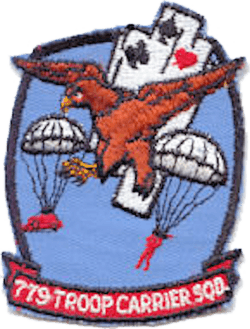779th Tactical Airlift Squadron
| 779th Tactical Airlift Squadron | |
|---|---|
|
Emblem of the 779th Troop Carrier Squadron (1960s) | |
| Active | 1943-1945; 1953-1971 |
| Country | United States |
| Branch | United States Air Force |
| Type | Tactical Airlift |

The 779th Tactical Airlift Squadron is an inactive United States Air Force unit. Its last was assigned to the 464th Tactical Airlift Wing, stationed at Pope Air Force Base, North Carolina. It was inactivated on 31 August 1971. During World War II, the 779th Bombardment Squadron was a B-24 Liberator heavy bomb squadron which saw combat with Fifteenth Air Force stationed in Italy, assigned to the 464th Bombardment Group.
History
Established as a B-24 Liberator heavy bomber squadron in mid-1943, trained under Second Air Force. Deployed to Mediterranean Theater of Operations (MTO), October 1943, becoming a Fifteenth Air Force heavy bomb squadron, attacking enemy targets both in the MTO and European Theater of Operations (ETO). After end of war in Europe, used B-24s for transport of personnel from various points in Europe to Waller Field, Trinidad, being attached to Air Transport Command. Inactivated 31 July 1945.
Reactivated as a Tactical Air Command troop carrier squadron, 1953. Performed Troop Carrier missions using tactical transport aircraft until 1971 when inactivated. In 1965 the squadron received twelve modified C-130E-(I)s for special operations use and began training with the new airplanes in early 1966. The C-130E-(I)s were assigned to Detachment One, 779th Troop Carrier Squadron. The 779th tactical airlift squadron was placed on alert shortly after the USS Pueblo was captured by North Koreain January 1968.They were deployed to Tachikawa, Japan shortly thereafter. After a few days at Tachikawa they were deployed to Cam Ranh Bay Viet Nam where they flew supply and troop transport during the TET offensive. While at Cam Ranh enemy rockets were fired at the base from the overlooking hills striking fuel drums and a fuel bladder but no damage was don to the C-130s parked nearby. In Early April 1968 they returned to Pope AFB, NC and were replaced in Cam Ranh Bay by the 778th tactical Airlift Squadron also from Pope AFB, NC. The detachment was re-designated as the 318th Special Operations Squadron in the late 1960s.
Lineage
- Constituted as the 779th Bombardment Squadron (Heavy) on 19 May 1943
- Activated on 1 August 1943
- Redesignated 779th Bombardment Squadron, Heavy on 29 September 1944
- Inactivated on 31 July 1945
- Redesignated 779th Bombardment Squadron, Very Heavy on 14 November 1945 (Remained inactive)
- Redesignated 779th Troop Carrier Squadron, Medium on 15 December 1952
- Activated on 1 February 1953
- Redesignated 779th Troop Carrier Squadron;, Assault on 1 December 1958
- Redesignated 779th Troop Carrier Squadron, Medium on 8 January 1964
- Redesignated 779th Troop Carrier Squadron on 1 March 1966
- Redesignated 779th Tactical Airlift Squadron on 1 May 1967
- Inactivated on 31 August 1971 Assets absorbed by 41st Tactical Airlift Squadron.
Assignments
- 464th Bombardment Group, 1 August 1943 – 31 July 1945
- Attached to: Air Transport Command, 15 June-31 July 1945
- 464th Troop Carrier Group, 1 February 1953
- 464th Troop Carrier (later Tactical Airlift) Wing, 11 November 1957 - 31 August 1971 (attached to 315th Air Division 7 February 1968 - 31 March 1968)[1]
- Tail Code after 1968: PR
Stations
|
|
Aircraft
- B-24 Liberator, 1943–1945
- C-46 Commando, 1953–1954
- C-119 Flying Boxcar, 1953–1958
- C-123 Provider, 1958–1968
- C-130 Hercules, 1968–1971
See also
References
Notes
- ↑ "Factsheet 315 Air Division". Air Force Historical Research Agency. 12 October 2007. Archived from the original on October 30, 2012. Retrieved February 24, 2014.
Bibliography
![]() This article incorporates public domain material from the Air Force Historical Research Agency website http://www.afhra.af.mil/.
This article incorporates public domain material from the Air Force Historical Research Agency website http://www.afhra.af.mil/.
- Maurer, Maurer, ed. (1982) [1969]. Combat Squadrons of the Air Force, World War II (PDF) (reprint ed.). Washington, DC: Office of Air Force History. ISBN 0-405-12194-6. LCCN 70605402. OCLC 72556.
